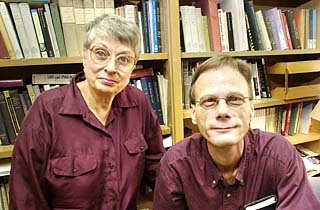Seeking the Recipe
Hermetic Studies has been marginalized academia since the enlightenment. Can a UT professor and grad student editing a journal change that?
By Michael Erard, Fri., Aug. 15, 2003

You might think that a periodical devoted to the study of alchemical thought from ancient Egypt to Harry Potter could easily get money -- when the universe resonates with the harmony of aligned planets, go salvage some hubcaps, pop-tops, and old bullets and transmute them into gold to pay the printer. Barring that, why not ride the pop-culture groove that's allowed J.K. Rowling, James Redfield, and Umberto Eco to make gold of their own?
When two members of UT's English department took over the editorship of Cauda Pavonis: Studies in Hermeticism, an academic journal, they were determined to get start-up money the old-fashioned way: Ask the dean.
"We spent lots of time getting lots of stuff together for a minuscule grant," moans Kate Frost, an English professor who describes herself as serving her students and the English Renaissance poet John Donne. But the dean turned her down, as did the English department, because "they said the department has enough journals. I mean, they turned down the Chaucer Review," Frost says.
Sitting in Frost's dim, cool office is Roger Rouland, a graduate student who is writing his dissertation on alchemy and poet Edmund Spenser, under Frost's direction. Rouland, who once taught an American literature survey course that pulled out alchemical threads in the work of writers as contemporary as Annie Dillard, says, "People hear the field, alchemical studies, and they think, 'flake.'"
"Crystal balls," Frost rejoins.
"Wicca."
"We're fighting the money battle and the image battle."
Asked if the two are linked, Frost says, "We got turned down out of hand." Now they figure that $10,000 would be enough to launch a real journal and an attractive, forward-looking multimedia Web product. Maybe, someday, the money will come from foundations or some rich individual. For the time being, Frost and Rouland are relying on scholarly love, that ancient art of protecting and disseminating sacred knowledge. And to get out their first issue, Frost will conjure that faithful handmaiden of scholarly devotion: family money. "It's a family inheritance I'm willing to spend on it," she says. How much has she spent so far? "I'd rather not say."
What's at stake is a scholarly field called hermetic studies, which has never really been given its due. Like the alchemists themselves, the people who study it have always been heterodox practitioners at the margins. Many of the original subscribers to Cauda Pavonis don't have e-mail addresses. "They're little old people still writing with quill pens," Frost says.
Cauda Pavonis had been edited since 1982 by Stanton Linden, a professor at Washington State University who did groundbreaking work in hermetic studies, publishing in 1996 Darke Hierogliphicks: Alchemy in English Literature From Chaucer to the Restoration. Linden explained that the journal's name is a Latin phrase, full of alchemical symbolism, that means "tail of the peacock." Alchemical writers used "tail of the peacock" to describe a variegated color of red, blue, and green that was a sign of one substance turning into another.
"Hermeticism" is the name given to a group of magical practices that includes alchemy, astrology, sacred geometry, and numerology. From the Middle Ages onward, people in Europe practiced these arts under the direction of mysterious texts supposedly written by a quasi-mythological, ancient Egyptian figure named Hermes Trismegistus, or "the thrice-wise Hermes." Trismegistus had sat at the feet of Moses, carried an emerald upon which was recorded all of philosophy, and, according to the English occultist Francis Barrett, "had communicated the sum of the Abyss, and divine knowledge to all posterity."
In 1614, the legend of Hermes Trismegistus was debunked by Isaac Casaubon in De Rebus Sacris et Ecclesiaticis Exercitiones XVI, which showed that the texts attributed to Hermes were actually written in the Christian era by people with the agenda of linking their Christian thought to an older philosophy called neo-Platonism. Alchemists of the Middle Ages had effectively put the cart before the horse, Frost says. "The reason [Hermes' writing] sounds so Christian is because it was written by Christians."
In the meantime, nearly all the poetry, music, art, and architecture from the Middle Ages through the Renaissance had been based on hermeticism. Even after it was driven underground by the Inquisition and the Enlightenment, it persisted quietly, reappearing in Nazi Germany and then in the U.S. in the 1970s in the form of New Age thought.
"There has always been a large market for alchemical studies and astrology, or studies in witchcraft or magic, but lots of it is very popular," Linden says. "But the identity of Cauda Pavonis is much more with the serious academic pursuit." A typical issue of the journal would contain articles on alchemy and magic, ancient Egyptian philosophy, Renaissance poetry, medieval architecture, the early history of science, and modern efflorescences of hermeticism in pop culture like Led Zeppelin lyrics and Jorge Luis Borges short stories and Harry Potter novels.
Linden took the journal's name from an even older newsletter that had been published sporadically in the 1970s by a professor at the University of New Mexico, Eugene Cunnar, and turned it into a bona fide peer-reviewed academic journal. That makes Cauda Pavonis the oldest continually running journal of hermetic studies in the U.S. In its heyday, Linden sent out 400 copies; more recently it has been cut to 100, and costs $16 for two issues a year, which is a bargain as academic journals go. In Europe, where hermetic studies have always been more robust, some older journals exist, the most established of which is Ambix, the journal for the history of alchemy and early chemistry, which was founded in England after World War I.
In 2001, Frost was giving a paper at a conference with Linden, who mentioned he was retiring soon and shopping for a home for Cauda Pavonis. Otherwise, it would die. On the spot Frost snapped it up, but not for herself; she called Rouland that day to tell him she had the best Christmas present but that she wouldn't give it to him until she saw him in person.
Rouland accepted the gift with an arm-pumping "yes!" What Frost knew was that he'd wanted to be the editor of Cauda Pavonis since the early 1990s, when he became interested in alchemy as a grad student in Illinois, met Stanton Linden, and even published a paper in the journal. When he graduates and moves on -- "to an academic job," Frost says, knocking on the plastic veneer of her desk -- he'll take Cauda Pavonis with him to help secure the future of hermetic studies. The goal is not only to fend off what Frost derides as "New Age" ("We want to keep our scholarly cool," she says), but to bring hermeticism to the attention of literary scholars.
"You know that literary studies really don't study literature anymore. It's all cultural studies," Rouland says. "But hermetic studies is the real cultural studies. This is the foundation of everything. Cosmology, cosmogony, everything. That was the culture back then. So when [scholars] focus on the shoes women were wearing in the 1590s -- who gives a shit? This is why they might have been wearing those shoes."
Frost stresses that she doesn't practice astrology or alchemy and hates it when people ask her what her number is. But just like real-life practicing alchemists, the life of the alchemical scholar is a lifestyle, not a fashion. It's a vast field that makes serious JFK conspiracy, UFO studies, or cryptozoology look like weekend hobbies. "It's hard; this stuff is hard," she says. "You have to read. My brain is like an attic. It's like an airplane hangar. That's why people ignore hermetic studies. You can't read only the books from the last five years."
Yet what makes hermeticism so popular is that it addresses a basic human need. "Everyone is searching for the recipe," Rouland says. "We're all seeking purification, perfection, refining. We're all trying to get rid of the dross. We're trying to reach perfection. For people to say the spiritual alchemists are 'flakes' is not quite right, because we're all engaged in that search."
"If we could only get some money!" Frost exclaims.
"This stuff is everywhere. We want to show it to you. We don't want to be a footnote," Rouland says.
Is not wanting to be a footnote more elementary than the desire for transformation?
Rouland thinks for a moment. "That's the quagmire that the alchemists had to face," he says. "Before they faced their quest, they had to be purified. Part of being purified is not to be vain." ![]()








